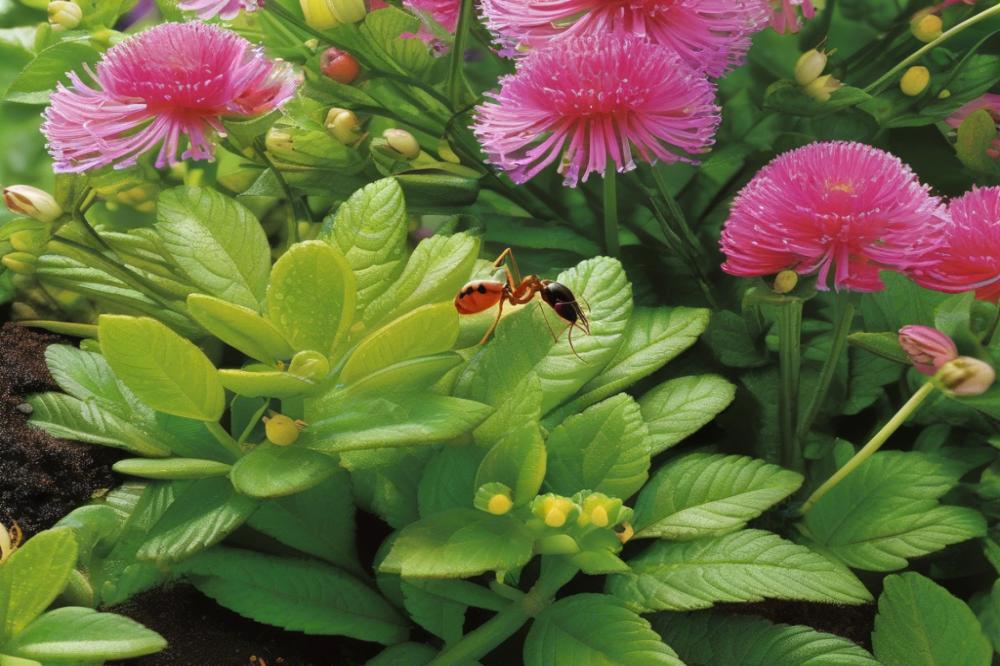Overview of garden ants as Common Pests
garden ants are a familiar sight in many backyards and gardens. They often invade flower beds, vegetable patches, and picnic areas, making their presence known with small trails of busy workers. These tiny pests are a nuisance for homeowners, particularly during warmer months. Their ability to gather in large numbers can lead to infestations that frustrate even the most patient of gardeners.
Importance of Using natural remedies for ant control


Using eco-friendly options for ant control is crucial when striving to maintain a healthy garden. Chemical pesticides may offer quick fixes, but they often come with risks. They can harm beneficial insects, pollinators, and even pets. Natural methods provide effective solutions without the negative environmental impact. With natural remedies, gardeners can tackle ant problems while being kind to the earth.
A Brief Introduction to eco-friendly Options


Several options stand out for those seeking to manage garden ants naturally. Essential oils are powerful tools for repelling these pests. Peppermint oil, for instance, not only smells great but also drives ants away from treated areas. Diatomaceous earth acts as a mechanical pesticide, causing dehydration in ants that come in contact with it. Additionally, common household items like vinegar and lemon juice can deter ants effectively. Baking soda mixed with sugar is another clever trick to lure and control the population. Soap solutions and traps can also help manage ant numbers. These methods offer safe yet efficient ways to curb the annoyance of garden ants, making for a harmonious gardening experience.
Understanding Garden Ants


Identification of Common Garden Ant Species
Garden ants come in many varieties. The black garden ant and the red imported fire ant are among the most common species. Black garden ants are usually small, shiny, and can be found in numerous habitat types. They thrive in lawns, flower beds, and along garden borders. Fire ants, on the other hand, are more aggressive and known for their painful stings. Observing their color, size, and nesting habits can help in identifying them.
Behavior and Habits of Garden Ants
Ants are social insects. They live in colonies that can house thousands of individuals. Typically, these colonies have a queen, workers, and sometimes drones. Workers search for food and build nests. They often patrol garden areas, especially during warm months. Many people may notice trails of ants marching in single file. This organized behavior helps them efficiently gather resources. Notably, they thrive in decaying organic matter, which they use for feeding their colonies.
The Role of Ants in the Garden Ecosystem
These insects play an important part in maintaining ecological balance. Garden ants help aerate the soil as they tunnel through it. This improves water absorption and nutrient distribution. In addition, they can control pest populations by preying on smaller insects. Some gardeners even consider them beneficial due to their role as scavengers. Ants can also help with seed dispersal, promoting plant growth.
Integrating various organic methods for ant control can be effective. Eco-friendly options include using essential oils like peppermint, which many ants find unappealing. Vinegar and lemon juice can act as natural deterrents, disrupting their scent trails. A soap solution mixed with water proves useful as well, suffocating ants on contact. Diatomaceous earth offers a different approach; its powdery texture causes harm to ants’ exoskeletons. Meanwhile, placing traps around the garden can help minimize their presence without harsh chemicals. Baking soda, combined with sugar, serves as another natural remedy that might work in your favor.
Essential Natural Remedies


Error-prone and persistent, garden ants can quickly turn a flourishing backyard into a source of frustration. While chemical pesticides typically promise quick fixes, many people are looking for eco-friendly alternatives. Several solutions exist that can effectively manage these tiny invaders without harming the environment.
Using Essential Oils for Repelling Ants
Essential oils have become popular for their ability to repel unwanted pests. Among these, peppermint oil stands out as one of the most effective. Its strong scent disrupts ant trails, making it difficult for them to navigate. Other essential oils like tea tree and clove oil also offer benefits against these pests.
Mixing essential oils with a carrier can boost their effectiveness. A simple spray can be created by combining a few drops of peppermint oil with water and a bit of liquid soap. This mixture can easily be applied to areas where ants tend to invade.
Recipe Ideas Using Peppermint Oil and Other Essential Oils
Create a powerful repellant by mixing peppermint oil with vinegar. This combination not only helps to repel ants but also cleans surfaces at the same time. A mixture of one part water to one part vinegar with about fifteen drops of peppermint oil can work wonders.
Another interesting formula involves adding a few tablespoons of lemon juice to a cup of water. The high acidity creates an environment that ants dislike. Spray this solution around entry points like doors and windows.
Individuals can take advantage of baking soda too. A simple mixture of baking soda and sugar can act as a trap for ants. The sugar lures them in while the baking soda disrupts their digestive systems.
Additionally, using diatomaceous earth provides another layer of protection. Sprinkling it around the garden or near ant nests can trap and dehydrate the ants. This natural powder consists of tiny fossilized aquatic organisms and is safe for plants and pets.
Ultimately, creating a soap solution can also be very effective. Mixing warm water with a few drops of dish soap creates a thin layer that suffocates ants on contact. Spray directly on them or where they tend to gather for quick ant control.
Choosing the right method often depends on personal preference and the severity of the ant problem. Each of these eco-friendly remedies not only helps to manage ants but also supports a healthier garden ecosystem.
Household Ingredients for Ant Management
Vinegar as an Effective Ant Deterrent
Vinegar stands out as a powerful natural option for ant control. This simple kitchen staple disrupts an ant’s scent trails, making it harder for them to navigate. To use it effectively, mix equal parts of vinegar and water in a spray bottle. Apply this solution around entry points like windows and doors, or where ants are commonly seen. The strong smell of vinegar is often enough to chase ants away from areas where they are unwelcome.
Lemon Juice and Its Repellent Properties
Lemon juice serves as another eco-friendly alternative for managing these pesky insects. Ants dislike the acidic nature of lemons, which can deter them from certain areas. Combine lemon juice with a little water and spray it around your home. You can also leave lemon peels near entryways to enhance the effect. It’s a fresh and natural way to keep ants at bay while adding a pleasant scent.
Baking Soda: A Natural Way to Combat Ants
Baking soda offers a unique method to tackle ant problems. When combined with sugar, it becomes enticing to ants. They consume it, but the baking soda reacts with their digestive system, leading to their demise. Simply mix equal parts of sugar and baking soda, then sprinkle the mixture in places where you notice ant activity. This method requires patience but can be quite effective in the long run.
Creating Soap Solution for Ant Traps
A soap solution can also be a practical choice for trapping ants. It is easy to prepare and works well to eliminate them on contact. To create this solution, combine water with a few drops of dish soap in a spray bottle. Spray directly onto the ants or around areas of activity. This not only kills ants quickly but also disrupts their trails, making it harder for others to follow.
Diatomaceous Earth as a Natural Barrier
What is diatomaceous earth?
Diatomaceous earth is a powder made from the fossilized remains of tiny aquatic organisms called diatoms. These organisms have a hard, silica-rich shell that forms the composition of this natural product. When ground into a fine powder, it becomes a popular option for various pest management strategies. This powder is not only safe for the environment but also effective against many household pests. It has a number of uses, making it a versatile addition to any eco-friendly gardening toolkit.
How diatomaceous earth works on ants
The effectiveness of diatomaceous earth comes from its unique structure. The fine particles are sharp on a microscopic level, which can damage the protective exoskeletons of insects, including ants. When ants come into contact with the powder, it causes them to lose moisture and ultimately leads to their demise. This method offers a more humane approach to ant control. Unlike toxic chemical options, it poses minimal risks to pets and people if applied correctly. In addition, the natural powder can be enhanced with essential oils, such as peppermint, to boost its repellent properties.
Application methods in the garden
Applying diatomaceous earth in the garden is straightforward. Begin by identifying areas where ant activity is prevalent. A light dusting around the perimeter of your garden helps create a barrier that ants will avoid. When using it near plants, apply carefully to avoid harming beneficial insects. Mix with water to create a soap solution that can be sprayed on affected areas for better adhesion. Other methods include placing it in traps or simply tossing it onto ant trails. To maximize effectiveness, reapply after heavy rains or watering.
In addition to diatomaceous earth, options like vinegar, lemon juice, and baking soda can also be incorporated into a pest management plan. Each of these methods serves a purpose in creating an ant-free environment. Adopting such eco-friendly approaches does not only help in controlling pests but also promotes a healthier garden ecosystem.
Building Effective Traps
Different Types of DIY Ant Traps
Creating traps can be a simple yet effective way to deal with ants. Many people prefer DIY methods over store-bought options. One popular trap involves using a mixture of sugar and water. This attracts ants and can keep them from invading your space. Another effective trap incorporates diatomaceous earth. When ants walk over this powder, it damages their exoskeleton, leading to dehydration. Simple designs can make a big difference in ant control without harming the environment.
Using Food Baits Within Traps
A successful trap often needs a tasty bait to lure ants effectively. Many homeowners find that sugar works wonders. Combine sugar with a bit of water or peanut butter for a potent mixture. Both can entice ants to venture into your trap. Some people even add a drop of vinegar to enhance the bait’s effectiveness. For those interested in eco-friendly solutions, a mixture of baking soda and sugar can be used as well. The baking soda will disrupt the ants’ digestive systems, leading to their end.
Combining Traps with Natural Remedies for Better Results
Combining traps with other techniques often yields the best results. Consider adding essential oils like peppermint to your traps. This not only attracts ants but also helps repel them. A soap solution can also be sprayed around the area to create a barrier. Mixing lemon juice with water and spraying it can disrupt ant trails. These methods work well in tandem with your traps. The key is to maintain consistency in your efforts. With patience, you can manage your ant problems naturally and effectively.
Preventative Measures
Strategies exist to deter ants before they invade your garden. Keeping the area clean is one of the most effective ways to ward off these pests. Food sources attract ants, so debris from fallen fruits, spilled seeds, and uneaten pet food should be cleaned up promptly.
Creating barriers is another helpful tactic. Consider using diatomaceous earth around the borders of your garden. This natural powder can dehydrate and kill ants that come in contact with it.
Using natural deterrents can further help in controlling ant populations. Vinegar is a popular choice. A solution of vinegar and water can be sprayed in areas where ants are seen. Lemon juice also acts as a barrier. Ants are not fond of its strong scent, making it another option for those seeking eco-friendly methods.
Essential oils, such as peppermint, can disrupt ant trails. Mixing a few drops with water creates a powerful spray that can deter ants. Similar to this, a soap solution can be effective. When mixed with water, it clogs their breathing pores, leading to their demise.
Traps can also be effective in controlling ant numbers. Homemade traps using baking soda and sugar can attract and kill ants. The sugar lures them in while the baking soda disrupts their digestive system.
Pay attention to potential entry points. Ensure that cracks and crevices are sealed to keep ants at bay. Regular inspection of these areas will help maintain a barrier against them. Remember, being proactive will make a significant difference in managing ants before they become a problem in your garden.
Wrapping Up Our Discussion
In this article, we explored various methods to manage garden ants effectively. Some of the highlighted strategies included using diatomaceous earth, vinegar, and essential oils. Each of these solutions offers a safer alternative to chemical pesticides. They’re effective for keeping ants at bay while maintaining the health of your plants.
Adopting these eco-friendly practices can significantly benefit your garden. By choosing natural options, you contribute to a healthier ecosystem. Remember, ants are part of nature’s balance—they can help with aerating soil and controlling other pests. It’s crucial to find a method that aligns with your gardening philosophy.
Always consider long-term results when thinking about ant control. It’s best to understand the role ants play before deciding on any aggressive measures. Maintaining a harmonious garden requires a thoughtful approach. By integrating natural solutions, you can create an environment that supports both your plants and beneficial insects. Your garden can thrive without harsh chemicals, making it a safe haven for all its inhabitants.



